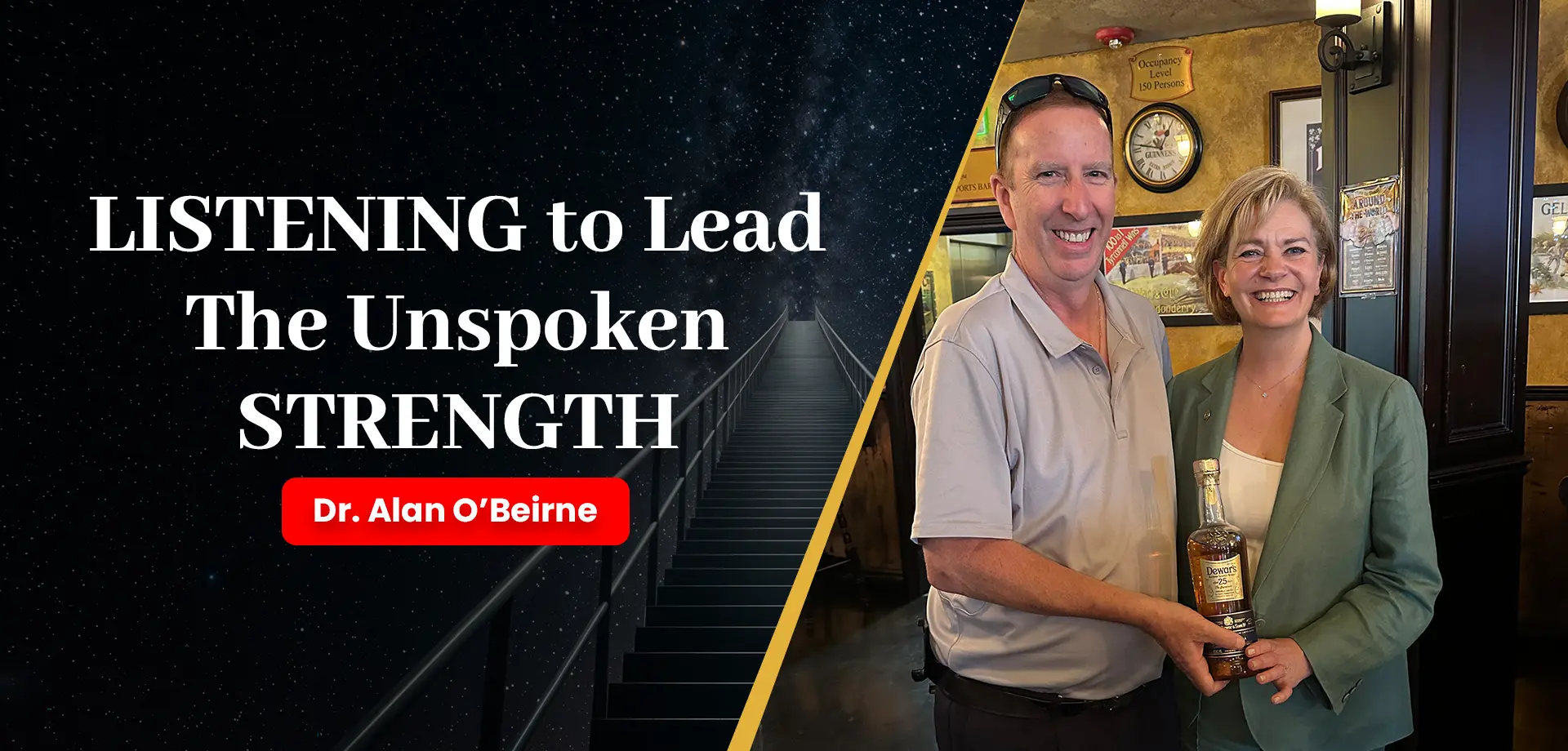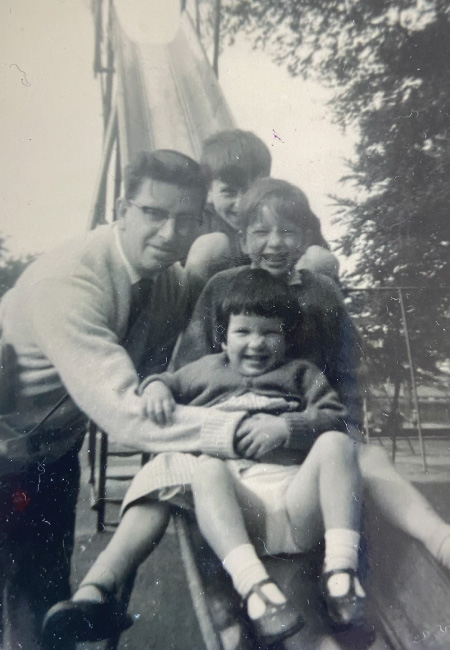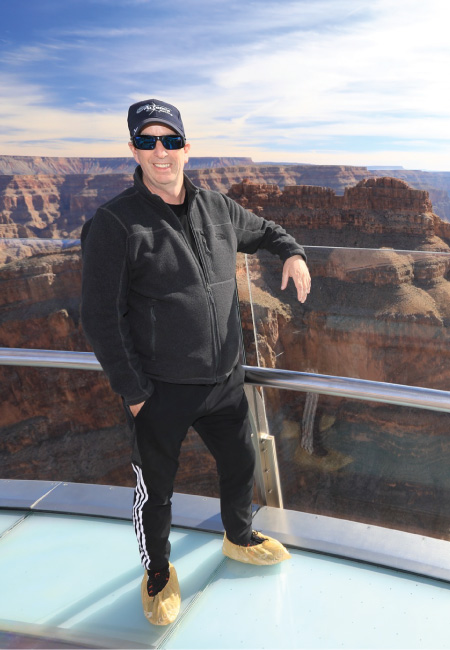

“It’s not the title that defines the man—it’s the character behind it.”
Introduction
From the very first conversation with Dr. Alan O’Beirne, one senses a rare kind of steadiness. He speaks not to impress, but to connect. There is no rush in his words, no need to dominate a room—just quiet confidence rooted in decades of lived experience, challenge, and growth. His story is not crafted to inspire—it simply does.
Born in the vibrant city of Edinburgh, Scotland, Dr. O’Beirne was shaped early on by the dynamics of a tightly-knit, disciplined family. His father, Leslie, worked as an electrical engineer—a man of logic and precision. His mother, Morag, served as a company secretary, grounded in structure and diligence. Between an elder brother who excelled and a younger sister who received doting attention, Dr. O’Beirne, as the middle child, learned early that his journey would be one of self-definition.
What others called rebellion, he called independence. As a child, he was curious, spirited, and restless—not for the sake of chaos, but in pursuit of meaning. While academics never truly captured his interest, working with his hands and understanding how things functioned did. He graduated from Broughton High School with a few O-levels, but more importantly, with an evolving sense that he wouldn’t follow a traditional path. He would create his own.
At the age of sixteen, he spent a summer working with his grandparents on Scotland’s west coast, employed by an oil rig construction company. There, he contributed to building the first concrete oil platform to float in the North Sea. It wasn’t glamorous—but it was foundational. It was the first of many moments that would define his character: hands-on, practical, and purpose-driven.
In March 1978, he took the bold step of joining the Royal Air Force, where he served for 12 years as a mechanical engineer. He was no longer a boy trying to be seen—he was a man trusted with missions, responsibilities, and lives. His military years were marked by rigor and unpredictability—firefighting, sanitation, rescue, and postings that tested both physical endurance and moral clarity. From deployments in Northern Ireland to the Falklands War in 1982, Dr. O’Beirne served with courage and composure, shaping not only his skills but his world view.
But even within a disciplined system, he remained true to his inner compass. When offered a post in a politically unstable Northern Ireland, he made a decision that would change his life: he chose to walk away. Not because he lacked commitment, but because he understood that bravery isn’t always staying—it’s also knowing when to redirect.
Phase 1 : Roots and Rebellion
"The Making of a Middle Child “I didn’t choose the middle-child life. The middle- child life chose me.”

From the very beginning, Dr. Alan O’Beirne stood in the shadowy, misunderstood center of his family dynamic—a classic case of “middle child,” born to Leslie and Morag O’Beirne in the culturally rich city of Edinburgh, Scotland. His childhood was shaped by structure, intellect, and the unspoken competition for visibility. His father, a highly logical and precise electrical engineer, instilled in the household a strong work ethic. His mother, a diligent company secretary, upheld grace and organization. Between an academically celebrated older brother and an affectionately doted younger sister, Dr. O’Beirne found himself compelled to stand out in his own way—not by conforming, but by challenging the mold.
He wasn’t a troublemaker. He was a seeker—curious, outspoken, restless. A boy who wouldn’t just do what he was told because “that’s the way it’s always been.” If his brother earned admiration through discipline and precision, and his sister through warmth and compliance, Dr. O’Beirne carved his identity through resilience and questioning.
His early education at Davidson’s Mains Primary School offered friendships, community spirit, and the innocent joys of childhood. But by the time he entered Broughton High School, his struggle to connect with conventional academic structures began to surface. He left school with a few O-levels, but more significantly, with a strong belief that his real education would come from the world—not a textbook.
As his brother advanced through university and his sister nurtured early career dreams, Dr. O’Beirne felt the pressure of invisibility. He wasn’t the first to achieve, nor the youngest to protect. He had to earn everything. That hunger would soon lead him down paths few dared to follow.
At the age of sixteen, he spent the summer with his grandparents on the west coast of Scotland. Far from leisure, this summer offered grit and challenge. He worked for a company involved in constructing the first concrete oil platform designed to float in the North Sea. It was hard labor—physical, cold, and demanding—but it taught him that true pride comes not from applause, but from contribution.
That job marked his first real taste of what it meant to build something lasting with his own hands. It wasn’t glamorous. It wasn’t celebrated. But it mattered. That mattered to him. Still, life at home was complicated. While his mother and grandparents offered gentle support and understanding, his father was harder to reach emotionally. The expectations were high, but the praise was rare. This imbalance only strengthened his need to prove himself—not to others, but to the version of himself he knew he could become.
Phase 2 : Into the Wild
"A Teacher Among Peaks and Purpose “Real education doesn’t always happen in a classroom—it often begins where the road ends.”

After departing from the structure and order of military life, Dr. Alan O’Beirne stood at a turning point—not in confusion, but with curiosity. He didn’t see the end of his service as an exit. He saw it as an invitation—an open door to explore where his real gifts could be used next. And those gifts, as he would discover, were rooted in teaching, guiding, and human connection.
Shortly after leaving the Royal Air Force, Dr. O’Beirne stepped into the world of outdoor education. He joined Outward Bound in Ullswater, nestled in England’s scenic Lake District. There, the lessons didn’t come from chalkboards—they came from nature, from challenge, from resilience. He began working with people from all walks of life, but found his deepest calling in educating and empowering the physically challenged.
For many, the idea of instructing those with physical limitations might sound daunting. But to Dr. O’Beirne, it was the most honest form of teaching—because it wasn’t just about technique. It was about patience, encouragement, and transformation. He helped individuals experience confidence through the power of climbing, canoeing, navigating, and surviving in rugged landscapes. These weren’t just adventures. These were breakthroughs.
It was in this space—of mentorship and vulnerability—that Dr. O’Beirne’s signature empathy began to shine. He didn’t just instruct. He learned. From those who couldn’t see, he learned to read Braille playing cards. He couldn’t sign Braille himself, but he could read it—and that was enough to play fair, to connect, and to share laughter in the darkness of night under the stars. That’s who he was becoming: a guide not just through terrain, but through humanity. But his journey didn’t stop in England.
He soon found himself drawn to Nepal, a land of breathtaking altitude and profound humility. Far from the comforts of Europe, Dr. O’Beirne immersed himself in the villages of the Himalayas, working side by side with British nurses to offer medical aid, education, and emotional support to communities with limited access to formal healthcare.
One moment stands out in his memory—a four-year-old boy who had suffered a traumatic head injury after falling on a rock. Locals had packed the wound with toothpaste in an effort to protect it, lacking proper treatment. When Dr. O’Beirne and a nurse examined the child, they cleaned the wound, removed embedded stone fragments, and administered antibiotics. The boy refused to go to a hospital. But within two weeks, the wound had healed, and he was playing football with his friends—his laughter echoing through the same mountain air that had once carried his cries.
Phase 3 : Island of Grit
"Rising Through Bermuda’s Hospitality World “Leadership doesn’t come from a title—it comes from showing up when others are unsure.”

When Dr. Alan O’Beirne stepped off the plane in Bermuda, he wasn’t just entering a new location—he was walking into the next phase of his legacy. The move was spurred by his beloved brother, David, who had already made the island his home and had seen in Dr. O’Beirne a capacity for excellence far beyond what the military or mountains had offered.
For many, Bermuda is a paradise. For Dr. O’Beirne, it became a canvas for transformation. The skills he had developed over the years—from mechanical discipline to people-focused teaching—would now be applied in the elegant but high-pressure world of hospitality.
He began, as he often had in life, from the ground up. His first role was as a restaurant supervisor, but within those first few months, it became clear to everyone around him: this was no ordinary manager. His approach was never just about service—it was about experience, empathy, and systems that worked under pressure. It didn’t take long before Dr. O’Beirne moved up the ranks, ultimately becoming the Director of Food and Beverage, overseeing multiple restaurants and managing teams of all backgrounds, personalities, and ambitions.
But beyond the polished silverware and crisp uniforms, Bermuda posed challenges of a different kind. The island, like many others, carried the weight of racial and social divides—subtle, systemic, and often unspoken. Where others might have looked the other way, Dr. O’Beirne faced it with grace, patience, and authenticity. He never raised his voice. He listened. He let others speak, even rant. And when they were done, he would calmly say, “Now let’s figure out how to move forward.”
He became known not only for his operational brilliance but for his emotional intelligence, his ability to de-escalate, to mediate, and to lift. His team didn’t just work for him. They believed in him. And that belief was earned, not demanded.
One of his most enduring contributions to Bermuda’s hospitality sector came in the form of a manual—not a symbolic one, but a practical, life-saving document. When he arrived, he found that the existing hurricane preparedness plan in the hotel where he worked was barely two pages long. It only covered responsibilities for senior staff and left the rest of the employees standing by, unsure and unprepared.